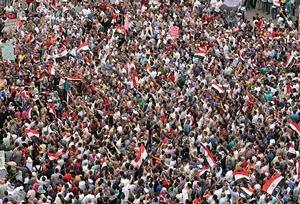
Egyptian rally in Cairo's Tahrir Square on May 27, 2011. The demonstration was called the "second revolution" calling for the removal of military rule., a photo by Pan-African News Wire File Photos on Flickr.
May 27, 2011
At a Protest In Cairo, One Group Is Missing
By DAVID D. KIRKPATRICK
CAIRO — Tens of thousands of mostly liberal protesters again filled Tahrir Square on Friday to press for an assortment of demands in a demonstration billed as “The Revolution Part II, ” but perhaps most notable for the absence of the Muslim Brotherhood.
The protesters called on the military council now ruling Egypt to end the practice of sending civilians to military trials, to expedite legal action against former President Hosni Mubarak and his associates, and to start governing with some civilian presidential council.
But the rally may have been most significant as a display of the liberal factions’ strength in Egyptian politics. It was the first time since the Jan. 25 day of protests that kicked off the revolution that the Muslim Brotherhood, Egypt’s largest and best-organized political force, did not support a major street protest.
In the emerging battle lines of post-revolutionary Egyptian politics, many liberal activists and observers abroad say they fear that the Brotherhood’s organizational strength will give it an edge in the elections for Parliament this fall, which could, in turn, enable Islamists to put their stamp on Egypt’s Constitution when the new Parliament sets out a process for revising it.
“Constitution First,” declared a banner at the center of the square on Friday, expressing the liberal demand for the establishment of rules protecting individual freedoms and minority rights before elections begin.
The Brotherhood, aware of its organizational edge, campaigned hard for a referendum setting the election for this fall. The group, outlawed under Mr. Mubarak, has just moved from small and dingy offices to imposing, gleaming headquarters befitting a modern political party, and its satisfaction with the election timetable may have been a reason it did not support Friday’s protest.
“Where is the Brotherhood? Tahrir is here,” went one chant, referring to the square at the center of the revolution, whose name means “liberation” in Arabic.
“People liked the Brotherhood more under Mubarak because we knew the government attacked them for no reason,” Hossam Eddin Mohamed, 21, said. “But now, after the revolution, people know ‘O.K., there is the Brotherhood, but now there are a lot of other parties too.’ ”
There were also signs that the Brotherhood’s new prominence was bringing its own internal divisions to the fore. The youth wing of the Brotherhood, which is close to many of the young liberal activists, defied their elders to join the demonstration. The Brotherhood youth had also played a key role in the coalition of young activists who began the protests days before their Islamist elders fell in behind them.
Some liberal activists, however, worried that the impact of the demonstration itself might have been dulled by the internal divisions evident in the profusion of miscellaneous demands. Many speakers and signs called for goals that included economic measures like an increase in the minimum wage, and long-term political reforms like ensuring the independence of the judiciary.
In a statement on Thursday, Egypt’s military affirmed the right to peaceful protest and said its forces would stay away from the square, suggesting that some groups might be seeking to prompt a confrontation.
Liam Stack contributed reporting.
No comments:
Post a Comment